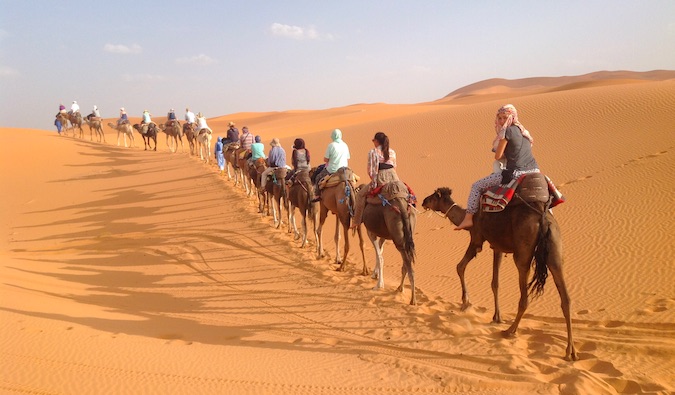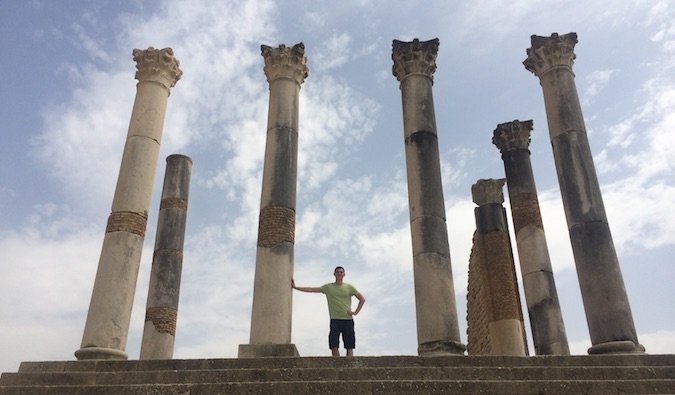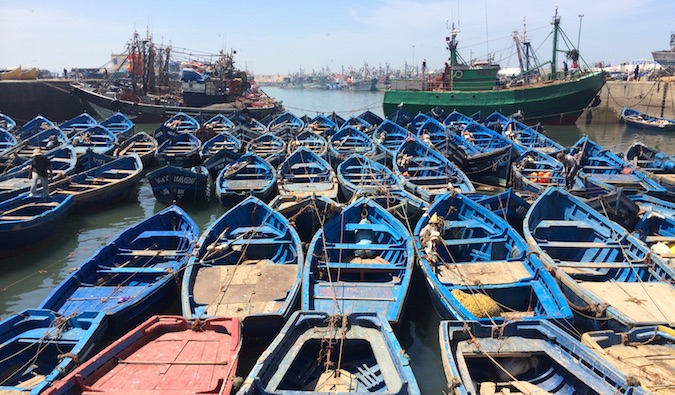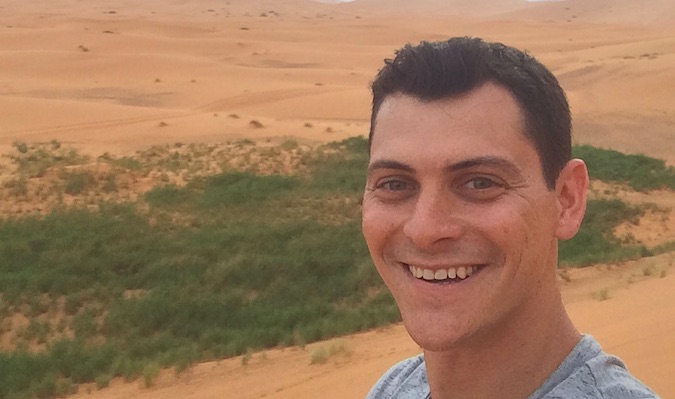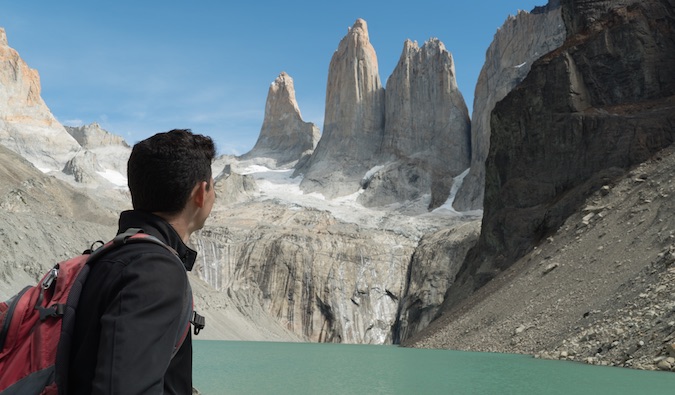
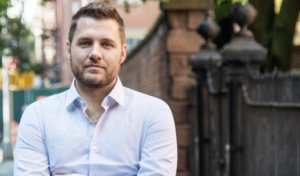
Posted: 05/14/2019 | May 14th, 2019
You meet a lot of interesting and smart people when you run an online business and travel the world. One of the people I’ve met is best-selling author Mark Manson. We had orbited each other for many years and finally met when he moved to New York City.
We’ve been “real life” friends ever since.
His first book, The Subtle Art of Not Giving a F*ck, became a runaway hit, selling over 8 million copies. (He wrote a post about how travel made him the person is today, which laid the foundation for that book.)
Now, Mark has a new book out today called, Everything is F*cked: A Book About Hope. I received a copy to read in advance and it’s a really incredible book about philosophy and how to live a life of meaning and challenge in our modern times. It gave me some good food for thought about issues or perspectives I hadn’t thought about before.
Today, Mark and I chat about his new book!
Nomadic Matt: You have a new book out, Everything is F*cked: A Book About Hope. Let’s talk about it. What would you say the core of this book is about?
Mark Manson: At its heart, this book is a look at how to develop and maintain a sense of hope for ourselves and the world — and how these hopes affect us. We generally see hope as an unequivocally “good” thing, but I call that idea into question in this book.
Would it be a considered follow up to The Subtle Art?
I’ve been calling it an “expansion” of the ideas from Subtle Art. I think it’s a deeper analysis and more complex application of the same concepts—values, pain/suffering, and our definitions of success. It’s kind of like the calculus to Subtle Art’s algebra or the chess to its checkers.
What inspired you to write this book?
Well, just looking around at what is going on in the world. We’re living in a weird time in that materially, the world, as a whole, is the best it’s ever been (less poverty, violence, more wealth, people living longer, etc.), yet mentally and emotionally, people are struggling more than ever with finding hope and meaning in their lives.
And what’s interesting is that it’s the people from the wealthiest and most stable parts of the world who are experiencing these philosophical struggles the most.
On top of that, I’ve noticed in my own life, that as an older millennial, all the promises of my youth have turned out pretty ugly. From the internet to my country and to my assumptions about relationships, friendships, community, it feels like there’s a lot to be justifiably upset about — yet things are objectively better.
I’ve had my own struggles with finding meaning and hope in my own life, despite the fact that, on paper, everything is awesome. So, in that way, this book is kind of my own way to sort through these issues.
Since this is a travel website, let’s talk about your book and travel. How can travel make us less f*cked? Or can it?
I think anything that increases human empathy is hugely important and beneficial at the moment. I also think anything that can cause you to confront your own value systems and question them is incredibly useful.
Travel does both of those things very well.
It’s a bit ironic that by connecting the world more than ever before, we’ve also come to objectify cultures more than ever before. Everything is about “the ‘Gram” so to speak. I think a highly conscious and culturally engaged form of travel is still paramount.
Like anything, travel can become an escape from one’s problems rather than a pursuit of some higher understanding. So, it’s important to always make sure you’re on the right side of that equation.
One aspect of the book I found really interesting was the formula for life and how it relates to being a better person (especially in relation to travel). Can you describe this idea a little bit?
The Formula of Humanity comes from the philosopher Emmanuel Kant and essentially says that the driving force behind all of our decisions and actions should always be people. That more than emotions, more than culture, more than group loyalties, our first principle should always be to treat people (both ourselves and others) with dignity and respect.
And I think travel forces one to practice this.
It’s easy to sit on one side of the world and criticize people on the other. But when you go there and discover that 99% of the people are good, decent people and actually value the same things you do, it makes empathy more possible.
What can people learn from your book that they can apply to their lives?
I think there are five points that people can really apply to their own life:
- Why self-discipline requires understanding your own emotions.
- Why trauma and loss cause emotional dysfunction and how we can overcome that dysfunction.
- How every belief system is ultimately a little bit religious and we need to be careful about that.
- How to be more resilient.
- How to be freer in a world of constant distraction and diversion.
You talk a lot about how our feelings brain being in control and that we live in a feelings economy, where emotions run rampant. Can travel temper that in any way? Can travel show us how not to be keyboard warriors?
Unfortunately, there’s no way to NOT be irrational and emotional, as much as we’d sometimes like to. The key is to not resist or attempt to change our emotions but simply work with them, rather than against them. Things like anger, anxiety or even despair can be highly useful if channeled properly. The key is to develop the skill-set to channel them.
I think like a lot of things, travel amplifies who you already are. If you’re selfish and intolerant, then your travel experiences will reflect that. If you’re magnanimous or curious, then they will reflect that. A way that travel can be useful is that it is a tool to force you to work on aspects of yourself that you wouldn’t otherwise be able to work on.
Do you struggle with being alone or caring too much about what others think? Travel alone.
Used to being pampered and upset over every little thing? Go take a train through the Indian countryside. That’ll straighten you out real quick!
You mention a lot of philosophers in your book (which I enjoyed because I got a lot of book suggestions). What are some good books to read around this topic?
It’s exciting because I feel like philosophy is becoming cool in our culture. It makes sense because as all of our basic needs are taken care of, these questions of existential meaning, purpose, and what to hope are more at the forefront of our minds, and those are all philosophical questions.
If you’re a complete newbie to philosophy and want to get a basic understanding of the Western canon, I recommend a book called Sophie’s World by Jostein Gaarder. It’s a fun fiction book that acts as kind of a primer to the most important western thinkers.
If you’re into eastern philosophy, DT Suzuki’s books are a nice introduction to Zen Buddhism. The Tao Te Ching is highly readable and thought-provoking. And Alan Watts’ books are indispensable.
And if you want to see how applications of ancient philosophy are incredibly useful in today’s world. Check out Jonathan Haidt’s The Happiness Hypothesis or Ryan Holiday’s The Obstacle is the Way.
You talk about how we need pain to grow and, I think, part of experiencing pain is getting out of your comfort zone. What can travel teach us about pain and growth?
Painful travel is the best kind. It’s like going to the gym for your mind and your understanding of humanity. My first trips to India and Africa were two of my most difficult and uncomfortable trips and today I think back to them fondly because they were incredibly formative to my understanding of the world.
India was shocking because of the quantity of beauty and human suffering squished into such confined spaces. You could see one of the most beautiful things in your life and one of the most horrific things in your life, all within a few blocks of each other.
Africa was eye-opening because when you really get out in the bush, you get a real sense of how little humans need to be happy. It’s cliché to say that money and possessions don’t make you happy, but when you see with your own eyes people who are feeling just fine owning nothing more than a goat and a robe, it’s quite profound.
China was probably the most alienating place I’ve ever been. I’ve never felt so foreign in my life. It’s the only place I’ve been where I’ve really gotten the sense that I did not matter, at all. And just having to sit and live with that feeling for the two weeks I was there was quite impactful.
I think it’s easy to forget how resilient the human spirit is, how many places it can flourish, and how easily it can be happy. The first time you see a child shit on the side of the street, it suddenly grants a lot of perspective the next time you complain about bad Wi-Fi.
Ultimately, I argue that a growing issue in the world today is that we aren’t challenged enough and that we don’t have meaningful struggles, so we have to invent meaningless ones to take their place and maintain a sense of hope.
Travel is a way to constantly challenge yourself. Whether it’s traveling to a poor country or forcing yourself to study a language or physically testing yourself through hikes and biking across continents. It’s indispensable.
Finally, in your own words, why should people buy this book?
Because it’s fucking awesome! And, as with my last book, I utilize stories and examples from all over the world and from a number of different cultures to make my point.
There’s a soldier from Poland and a monk from Vietnam and historical fiction about Isaac Newton and a vignette about Friedrich Nietzsche and his over-sized mustache. What’s not to love?
(Matt says: And it really is great like he says! Pick up a copy, especially if you enjoyed his last one!)

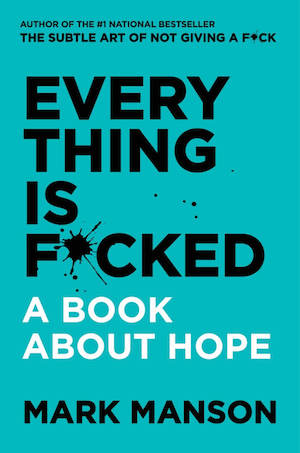 Mark Manson is a blogger, entrepreneur, and the best-selling author of The Subtle Art of Not Giving a F*ck, which has sold over 8 million copies worldwide. He specializes in writing personal development advice that doesn’t suck. His website MarkManson.net is read by over 2 million people each month.
Mark Manson is a blogger, entrepreneur, and the best-selling author of The Subtle Art of Not Giving a F*ck, which has sold over 8 million copies worldwide. He specializes in writing personal development advice that doesn’t suck. His website MarkManson.net is read by over 2 million people each month.
His new book, Everything is F*cked: A Book About Hope is now available. He lives in New York City.
Book Your Trip: Logistical Tips and Tricks
Book Your Flight
Find a cheap flight by using Skyscanner or Momondo. They are my two favorite search engines because they search websites and airlines around the globe so you always know no stone is left unturned.
Book Your Accommodation
You can book your hostel with Hostelworld as they have the largest inventory. If you want to stay somewhere other than a hostel, use Booking.com as they consistently return the cheapest rates for guesthouses and cheap hotels. I use them all the time.
Don’t Forget Travel Insurance
Travel insurance will protect you against illness, injury, theft, and cancellations. It’s comprehensive protection in case anything goes wrong. I never go on a trip without it as I’ve had to use it many times in the past. I’ve been using World Nomads for ten years. My favorite companies that offer the best service and value are:
- World Nomads (for everyone below 70)
- Insure My Trip (for those over 70)
Looking for the best companies to save money with?
Check out my resource page for the best companies to use when you travel! I list all the ones I use to save money when I travel – and that will save you time and money too!
